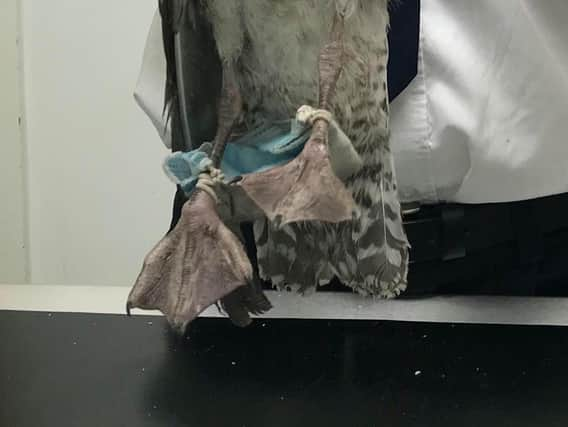RSPCA warns over face mask hazard to wildlife after rescuing 900 animals from litter since the start of lockdown, including 99 in Yorkshire


The RSPCA is warning people to “snip the straps” of discarded face masks to stop animals from becoming entangled.
North Yorkshire had particularly high rates of animals needing to be rescued, with 31 call-outs since the end of March.
Advertisement
Hide AdAdvertisement
Hide AdRates were high in the rest of Yorkshire too as West Yorkshire had 24 call-outs, East Yorkshire had 23 and South Yorkshire 21, amounting to 99 call-outs across the region.
The animal charity released pictures of one incident of a gull who was found to have a face mask tightly round his legs in Chelmsford, Essex.
Despite the face mask causing swelling to his legs, the bird has now fully recovered - but it is just one example as to how dangerous face masks can be to animals.
The message comes as the RSPCA backs Keep Britain Tidy’s Great British September Clean, which kicked off this week and runs until 27 September.
Advertisement
Hide AdAdvertisement
Hide AdSince lockdown started on 23 March, the RSPCA has dealt with 938 incidents of animals caught in litter, including tin cans, elastic bands and plastic bottles.
Chris Sherwood, the RSPCA’s chief executive, said: “For many years the public have been aware of the message to cut up plastic six-pack rings before throwing them away to stop animals getting tangled in them, and now we are keen to get out the message that the same should be done for face masks too - as very sadly, animals are susceptible to getting tangled up in them.
“Now that face masks are the norm, and may be for some time to come, this message is more important than ever as thousands of these masks are being thrown away every day. We’re concerned discarded face masks could become a significant hazard, particularly to wild animals and birds.
“Our RSPCA officers have had to rescue animals from getting tangled in face masks and we expect that this may go up as time goes on, so the best thing to do is to simply cut the elastic ear straps in half before throwing it away.”
Advertisement
Hide AdAdvertisement
Hide AdOther recent litter-related incidents which the RSPCA has dealt with since the start of lockdown include a fox stuck in a plastic bottle, who suffered deep cuts and was able to be rescued, and a gull killed by a kebab skewer.
Most cases of litter affecting animals are preventable if rubbish is disposed of properly and responsibly.
The RSPCA’s top tips to protect wildlife from litter:
- Recycle and reuse as much as possible - and put everything else in the bin;
- Cut the loop handles of plastic carrier bags before recycling to prevent animals being tangled;
Advertisement
Hide AdAdvertisement
Hide Ad- Cut plastic can holders and elastic bands so animals can’t get caught up;
- Cut up balloons before putting them in the bin;
- Cut up disposable gloves and snip the straps on face masks to prevent animals getting tangled;
- Clean and empty containers after use and pinch cans shut or cut containers in half before recycling.
Comment Guidelines
National World encourages reader discussion on our stories. User feedback, insights and back-and-forth exchanges add a rich layer of context to reporting. Please review our Community Guidelines before commenting.